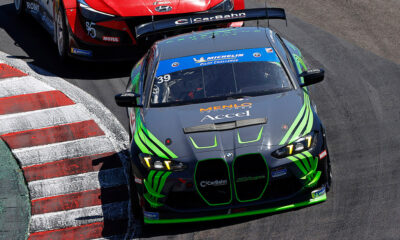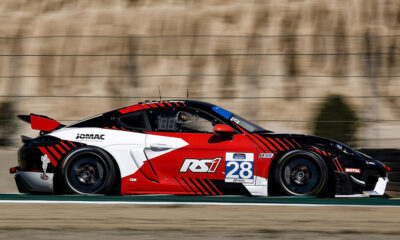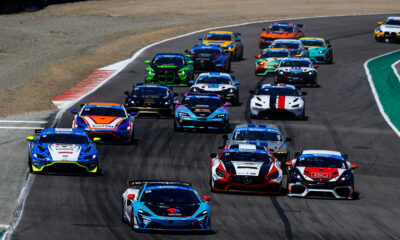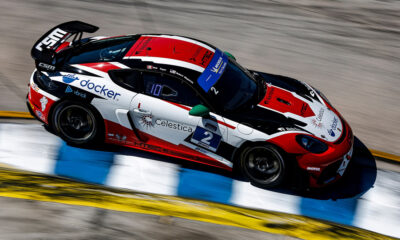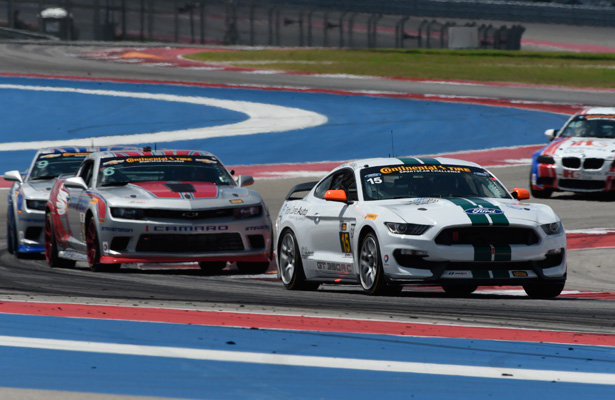
Photo: IMSA
Prior to Circuit of The Americas, IMSA released a series of efforts to cut operating costs further in the Continental Tire SportsCar Challenge for 2016, to address competitor concerns.
Several steps have been taken following IMSA’s released Mission Statement.
Notable changes outlined include introducing series-approved onboard air jack kits (non-mandatory) for all Continental Tire Challenge race cars, rewriting the Sporting Regulations to reflect a maximum of three crew members over the wall during pit stops, (down from four in 2015), and making additional changes regarding the “cold” side of the pit wall where tires can be placed.
IMSA has reached these decisions following a mix of competitor feedback from both GS and ST class teams.
“There were a number of ideas that started floating around Daytona,” Jeff Mishtawy, senior technical manager, Continental Tire SportsCar Challenge, told Sportscar365.
“Let’s better match the number of crew people required to service the car in paddock to what’s required in pit lane. Air jacks were a way to do that. Some team members brought it to us a while ago. It took a long time to find the right time to implement it.
“The over-the-wall regulations permitted four people that could touch the car, with a jack man, two tire guys and the fueler. Now we’ve reduced that to three.
“What the rules didn’t clarify before was that behind the wall, people could hand stuff over, tires and equipment. We’ve clarified that on the backside of the wall, that people can no longer do that. We’ve reduced need for help behind the wall as well as going over the wall.”
Mishtawy said while the amount in savings will vary from team-to-team, one team owner estimated the savings for a two-car team would be $75,000-80,000 next year.
Mishtawy said he’s also heard from a number of teams concerned about the number of days at the track per each event.
Steps have been taken to course correct that this year, although IMSA will work in the offseason to see the number go down further again in 2016.
“Jeff (Smallwood, Continental Tire SportsCar Challenge series manager) has worked really hard on shortening race weekends. That hasn’t been covered too much,” Mishtawy said.
“We reduced an additional nine days this year at the track, which is almost two race weekends. That’s pretty big.”
The other item that came out of IMSA’s release was a list of conditionally approved cars eligible to join the field in 2016.
It approves models such as the BMW M4, new 2016 Chevrolet Camaro (successor to the Z/28.R), Porsche Cayman GT4 in GS, and a host of other models in ST, including two Kia models and four different Volkswagen models.
Mishtawy explained the process for those cars to get conditionally approved.
“We did a pretty thorough examination of every car for sale on the U.S. road car market for all road cars,” Mishtawy said. “We put them all on spreadsheets and circulated them within the (IMSA) Technical Committee. We landed on a group of cars that fit within the spirit and technical requirements of GS and ST.
“GT4 (spec) are cars on a case-by-case basis. We can work with technical side of them to bring them into GS.
“We’ve had a number of inquiries about the conditionally approved cars, both of current and potential teams.
“As we said in the mission statement, when new cars come into the series, we have the duty to protect the teams that are already here. We can’t make things obsolete.
“We have to keep things balanced as possible, rather than raise the bar in costs and performance for the class. We need to control the top level of performance so the cars are at that window.”
The other area highlighted was a far improved working committee, with the IMSA Technical Committee’s introduction earlier this year, which presents a night-and-day difference compared to 12 months ago.
The committee includes Mishtawy, Smallwood, IMSA Managing Director, Racing Operations, Simon Hodgson, TUDOR Championship Series Manager Geoff Carter, IMSA Technical Director Scott Raymond, TUDOR Championship Senior Technical Manager Charlie Cook, and select members of the IMSA senior management team.
“I’ll characterize it as a radical structural change internally,” Mishtawy said. “Internally, it’s an entirely different company than at this point last year. It’s 100 percent positive improvement.”
Smallwood, the series manager, said the presence of a committee forces all its members to be on their game.
“One of the things that having a committee does is holds people accountable,” Smallwood told Sportscar365. “By having as many people around the sport as long as we have, there’s no hiding if you’re wrong on something.”
It was also noted that one of the areas addressed was how much faster Balance of Performance adjustments have been turned around this year.
There have only been a handful of BoP changes in total this year, three in ST and two in GS, Mishtawy said.
“Since Laguna it’s been on the same balance,” Mishtawy said. “The order has changed, but it’s been pretty consistent.”



















